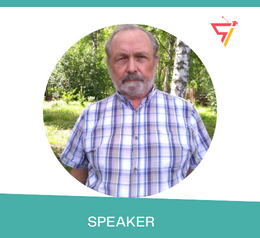Scholars 4th Edition International Conference on
Catalysis and Chemical Engineering
THEME: "Exploring Critical Breakthroughs in Catalysis and Chemical Engineering"
 27-28 Mar 2023
27-28 Mar 2023  Crowne Plaza Ealing, London, UK & Online
Crowne Plaza Ealing, London, UK & Online THEME: "Exploring Critical Breakthroughs in Catalysis and Chemical Engineering"
 27-28 Mar 2023
27-28 Mar 2023  Crowne Plaza Ealing, London, UK & Online
Crowne Plaza Ealing, London, UK & Online 
G.K. Boreskov Institute of Catalysis, Novosibirsk, Russia
Title: H2S: a new Inside into its Role in Human Activity
Biography
1972 – graduated from the Tomsk Poly-technical University, Russia
1972
– 2016 – researcher at the G.K. Boreskov Institute of Catalysis, Novosibirsk,
Russia
1977- PhD.: Title of the thesis: Properties of the
supported catalysts prepared via organometallic and alkoxide complexes of Mo,
W, Re and Pt.
1997- Professor of Chemistry. Title of the thesis:
Sulfide HDS catalysts: synthesis, structure, properties.
Since 2017 -
Pensioner
PROFESIONAL
POSITIONS:
Since 1995 - Head of the laboratory at the
Boreskov Institute of Catalysis.
since 1990 - Senior Researcher
1990 - Head of the Research Group
1978/90 - Researcher
1974/77 - Junior Researcher
1972/74 - Postgraduate Student
PROFESSIONAL
ACTIVITIES
Synthesis
and characterization of the transition metal complexes and sulfides, synthesis
of supported catalysts from the metal complex precursors, investigation of the
active component structure and mechanism of catalytic reactions; catalysts and
processes of hydro treatment of oil fractions and “bio-crude-oils”; acid-base
catalysis; thermodynamics; H2S chemistry; Sulfur chemistry; Hydrogen
chemistry;
The concept on the decisive role of solid catalysts in the reaction of low-temperature decomposition of H2S is considered in the framework of non-equilibrium thermodynamics of an irreversible process in an open system [1]. The reaction proceeds at room temperature without the use of external energy sources due to the internal (kinetic and potential) energy of hydrogen sulfide molecules. In the gas phase, this reaction is thermodynamically impossible. The reaction products are, along with hydrogen, either solid sulfur (sulfide catalysts) or diatomic gaseous sulfur in the ground triplet state (metal catalysts) [2]. The concept makes it possible to solve not only the problem of efficient utilization of H2S, but also opens new pages in the chemistry of this substance as both a source of atomic hydrogen and an energy supplier for activation of the chemically inert molecules. Moreover, the gaseous triplet sulfur discovered by us can be used in various fields of chemistry, pharmacology, medicine, etc. Therefore, "useless" H2S acquires the status of a "useful" chemical that will be probably in demand to solve problems which could not be realized within the framework of the previous paradigm of the high-energy disposal of H2S [3].